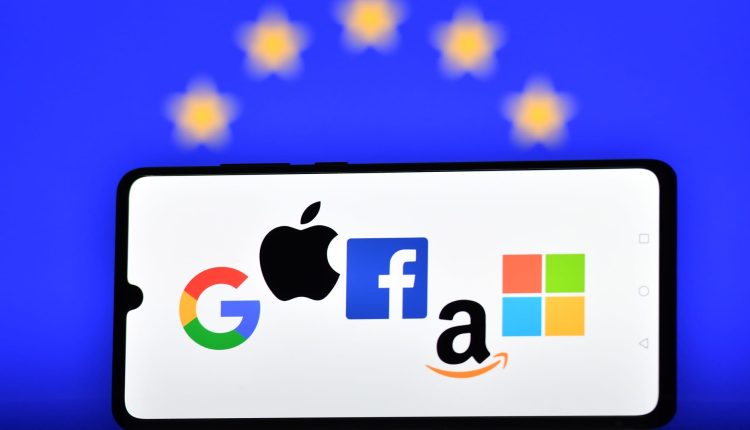The logos of Google, Apple, Facebook, Amazon and Microsoft displayed on a mobile phone with an EU flag shown in the background.
Justin Tallis | AFP via Getty Images
A raft of major technology and media companies have signed an open letter accusing tech giants of failing to bring their businesses into full compliance with incoming European Union digital competition rules.
The signatories say that companies defined by the EU as “gatekeepers,” including Google, Amazon, Apple, Meta, Microsoft, and TikTok owner ByteDance, haven’t done enough to engage effectively with them and others in their industry.
Under the EU’s Digital Markets Act, companies with more than 45 million monthly active users and a market capitalization over 75 billion euros ($81.2 billion) are considered gatekeepers.
They are required to, for example, make their messaging apps work with those of rivals, and let users decide which apps come pre-installed with their devices.
Another EU requirement is that these platforms do not implement practices that lead to the “self-preferencing” of their services over others.
The open letter, which was signed by international media group Schibsted, eco-friendly search engine Ecosia, privacy-focused search engine Qwant, secure messaging app Element, and VPN service ProtonVPN, said the gatekeepers “have either failed to engage in a dialogue with third parties or have presented solutions falling short of compliance with the DMA.”
They also said that businesses and consumers have been largely “kept in the dark” about what’s going to happen after March 7, 2024 — a pivotal deadline by which all six Big Tech gatekeepers need to get their businesses into compliance with the DMA.
“The signatories of this letter represent thousands of businesses affected by the DMA,” the letter stated. “They urge the gatekeepers to engage as soon as possible with business users and other stakeholders, such as business and consumer associations, in a constructive dialogue and make swift progress on their proposed compliance solutions.”
“They also urge the European Commission and the European Parliament to use all within their power to ensure that the gatekeepers comply with both the letter and spirit of the DMA, starting from 7 March 2024,” the signatories added.
Here are the 24 companies that signed the letter:
- Adevinta
- Allegro
- Billiger.de
- Ceneo
- CompareGroup
- Ecosia
- Element
- Favi
- Heureka Group
- Idealo
- Kelkoo
- Ladenzeile
- Le Guide.com
- OLX
- Open-Xchange
- Panther Holding GmbH
- Preis.de
- Prisjakt
- Proton
- Qwant
- Runnea
- Schibsted
- Solute
- Vipps
The EU Commission and the EU Parliament were not immediately available for comment on the issue when contacted by CNBC. CNBC also reached out to Google-parent Alphabet, Amazon, Apple, Meta, Microsoft, and ByteDance.
Christian Kroll, CEO and co-founder of Ecosia, told CNBC ahead of the open letter that regulators needed to keep large technology companies in check, or else risk businesses like his facing financial consequences.
“There has always been a huge challenge: Google has had the monopoly for over a decade, but I think we are currently more optimistic than that. It is yet to be determined what will happen on March 7 but we know that 2024 must be the year of fair choice in online search for Europe,” Klein told CNBC.
“EU policy makers have the choice to deliver a digital market that delivers fair competition and choice for European consumers and business,” Kroll added.
Of particular issue for Ecosia and other competing search engines was a proposal from Google for a “choice screen” that would display different search engines on the same window.
“Without a choice screen that is designed fairly, in the letter and spirit of the DMA, we will not see a positive shift in market share but rather further entrenchment of the dominance of gatekeepers such as Google – which would be a failure of the DMA,” Kroll added.
“Ahead of the March 2024 deadline, we need support from the EC and all hands on deck to ensure proactive engagement. The focus of digital regulators around the world will be on Europe as global interest in choice screens increases.”
Last week, the EU Commissioner for Competition Margrethe Vestager met with the CEOs of Apple, Alphabet, and Qualcomm to discuss regulation and competition policy compliance, according to a post by Vestager on X.
She said she had discussed Apple’s obligation to allow distribution of its apps outside the company’s proprietary AppStore, as well as ongoing competition cases including one involving the firm’s Apple Music music streaming platform.
With Google CEO Sundar Pichai, Vestager said she discussed the design of choice screens, self-preferencing requirements under the DMA, and an EU antitrust case looking at the company’s role in the advertising technology market.
She didn’t specify what was discussed with Qualcomm CEO Cristiano Amon.
Read the full article here

